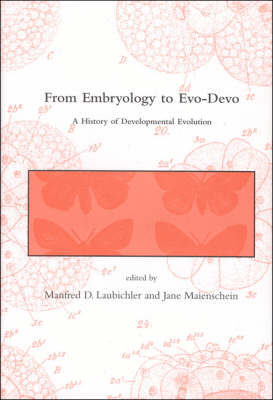
From Embryology to Evo-devo
A History of Developmental Evolution
Seiten
2007
MIT Press (Verlag)
978-0-262-12283-2 (ISBN)
MIT Press (Verlag)
978-0-262-12283-2 (ISBN)
- Titel ist leider vergriffen;
keine Neuauflage - Artikel merken
Brings together historians, philosophers, sociologists, and biologists to explore the history of the idea that embryological development and evolution are linked. This work examines events in the history of early twentieth century embryology and developmental genetics - including the fate of Haeckel's law and its various reformulations.
This work brings together historians, philosophers, sociologists, and biologists to explore the history of the idea that embryological development and evolution are linked. Although we now know that ontogeny (individual development) does not actually recapitulate phylogeny (evolutionary transformation), contrary to Ernst Haeckel's famous dictum, the relationship between embryological development and evolution remains the subject of intense scientific interest. In the 1990s a new field, evolutionary developmental biology (or evo-devo), was hailed as the synthesis of developmental and evolutionary biology. In "From Embryology to Evo-Devo", historians, philosophers, sociologists, and biologists offer diverse perspectives on the history of efforts to understand the links between development and evolution.
After examining events in the history of early twentieth century embryology and developmental genetics - including the fate of Haeckel's law and its various reformulations, the ideas of William Bateson, and Richard Goldschmidt's idiosyncratic synthesis of ontogeny and phylogeny - the contributors explore additional topics ranging from the history of comparative embryology in America to a philosophical-historical analysis of different research styles. Finally, three major figures in theoretical biology - Brian Hall, Gerd Muller, and Gunter Wagner - reflect on the past and future of evo-devo, particularly on the interdisciplinary nature of the field. The sum is an exciting interdisciplinary exploration of developmental evolution.
This work brings together historians, philosophers, sociologists, and biologists to explore the history of the idea that embryological development and evolution are linked. Although we now know that ontogeny (individual development) does not actually recapitulate phylogeny (evolutionary transformation), contrary to Ernst Haeckel's famous dictum, the relationship between embryological development and evolution remains the subject of intense scientific interest. In the 1990s a new field, evolutionary developmental biology (or evo-devo), was hailed as the synthesis of developmental and evolutionary biology. In "From Embryology to Evo-Devo", historians, philosophers, sociologists, and biologists offer diverse perspectives on the history of efforts to understand the links between development and evolution.
After examining events in the history of early twentieth century embryology and developmental genetics - including the fate of Haeckel's law and its various reformulations, the ideas of William Bateson, and Richard Goldschmidt's idiosyncratic synthesis of ontogeny and phylogeny - the contributors explore additional topics ranging from the history of comparative embryology in America to a philosophical-historical analysis of different research styles. Finally, three major figures in theoretical biology - Brian Hall, Gerd Muller, and Gunter Wagner - reflect on the past and future of evo-devo, particularly on the interdisciplinary nature of the field. The sum is an exciting interdisciplinary exploration of developmental evolution.
Manfred D. Laubichler is Assistant Professor in the School of Life Sciences at Arizona State University. Jane Maienschein is Regents' Professor and Parents Association Professor in the School of Life Sciences and Director of the Center of Biology and Society at Arizona State University.
| Erscheint lt. Verlag | 3.4.2007 |
|---|---|
| Reihe/Serie | Dibner Institute Studies in the History of Science & Technology Series |
| Zusatzinfo | 63 |
| Verlagsort | Cambridge, Mass. |
| Sprache | englisch |
| Maße | 152 x 229 mm |
| Gewicht | 1044 g |
| Themenwelt | Naturwissenschaften ► Biologie ► Evolution |
| Naturwissenschaften ► Biologie ► Genetik / Molekularbiologie | |
| ISBN-10 | 0-262-12283-9 / 0262122839 |
| ISBN-13 | 978-0-262-12283-2 / 9780262122832 |
| Zustand | Neuware |
| Haben Sie eine Frage zum Produkt? |
Mehr entdecken
aus dem Bereich
aus dem Bereich
Wie die Vernichtung der Arten unser Überleben bedroht - Der …
Buch | Softcover (2023)
Penguin (Verlag)
CHF 20,95


